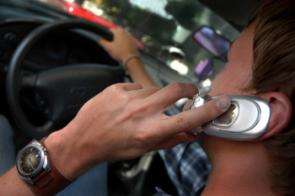Hold the Phone

A new law taking effect in North Carolina today (Dec. 1) is putting the brakes on cell phone use by teen drivers. But do teenagers yapping on the phone behind the wheel pose a bigger safety risk than other phone-wielding drivers?
Research conducted at North Carolina State University revealed that drivers who use cell phones don’t believe they pose a danger on the roads – they tend to believe the problem rests with other drivers talking on their phones.
“Cell phone users believe that they are better than other people in using their cell phone safely while driving,” says Dr. Michael Wogalter, an NC State psychology professor. “They believe that other drivers are more dangerous using a cell phone than themselves.”
Wogalter and NC State colleague Dr. Chris Mayhorn, assistant professor of psychology, also found that cell phone users don’t want other drivers talking on their phones, yet they generally don’t support laws that prohibit or restrict cell phone use while driving.
The new state law prohibits drivers under the age of 18 to talk on the phone while driving, except during emergencies or when talking to their parents, guardians or spouse. North Carolina is the latest state to pass legislation that restricts cell phone use among certain drivers, primarily teens and school-bus drivers.
Some states give local governments the power to enact cell phone restrictions, and other states ban the use of handheld phones altogether. According to the Governors’ Highway Safety Association, Connecticut, New York, New Jersey and the District of Columbia have banned talking on handheld devices while driving, yet allow the use of hands-free devices.
Although a number of safety devices exist for cell phone users, such as voice-activation and hands-free accessories, only a fraction of drivers responding to NC State’s study reported using them. Wogalter says more people might use hands-free features if they were more compatible with driving tasks. For example, cell phone makers could incorporate better design features to limit the need to glance at the phone to determine finger placement.
Wogalter has found that tactile cues such as textured or raised keypad digits aid cell phone users when they can’t rely on visual clues. In a separate study, Wogalter discovered dialing performance improved when buttons and keypads with more discernable surfaces were used. The findings suggest that incorporating such sensory features in cell phone designs can not only enhance usability, it may also enhance safety in reduced-visibility situations such as driving.
While safety devices are helpful in decreasing the distractions of talking on the phone while driving, such features can’t eliminate all distractions. Talking on the phone involves a high degree of concentration, which takes away from a driver’s awareness.
In study at NC State’s College of Engineering involving the use of adaptive cruise control – a new technology that automatically adjusts vehicle speed to maintain a specified distance from the vehicle directly in front of it – researchers found that cell phone use was detrimental to a driver’s situational awareness with and without adaptive cruise control.
“The important thing is cell phone use negatively impacts situational awareness, and situational awareness has been linked to effective decision-making and performance,” says Dr. David Kaber, associate professor of engineering. “People may say ‘I’m using my cell phone, and I can brake in time’ or ‘I can keep my car in the lane’ or ‘I can maintain my speed,’ but the problem is that it is having an impact on their attentional resources. It compromises their overall awareness of the driving environment, and when a critical condition develops, they may not be prepared to deal with it.”
Source: NC State University





















